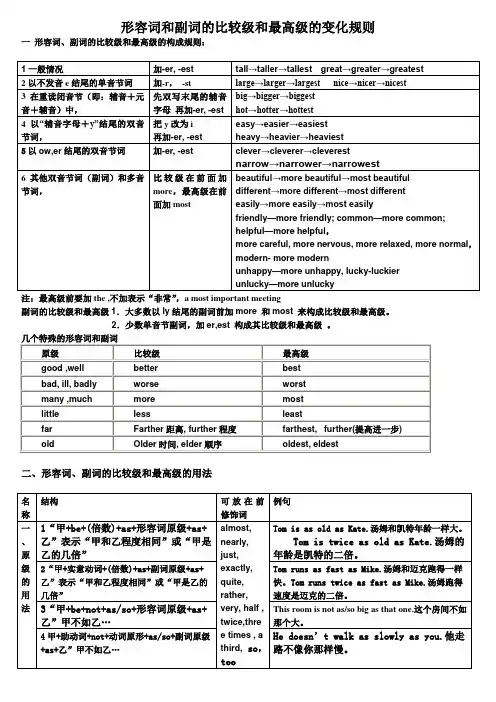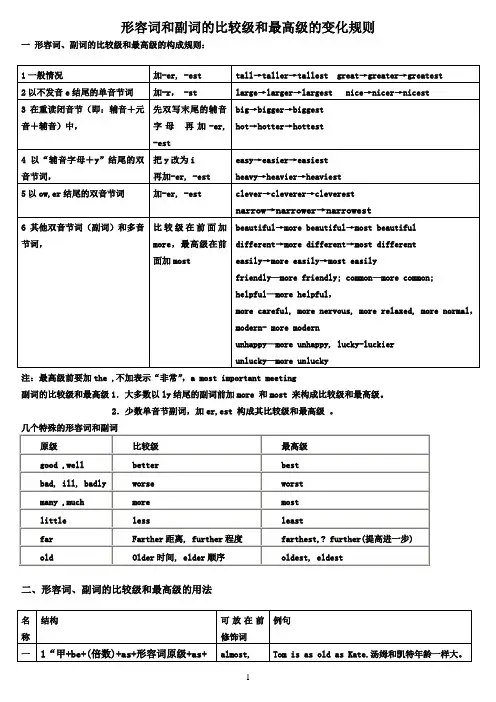比较级和最高级表格
- 格式:doc
- 大小:76.00 KB
- 文档页数:3
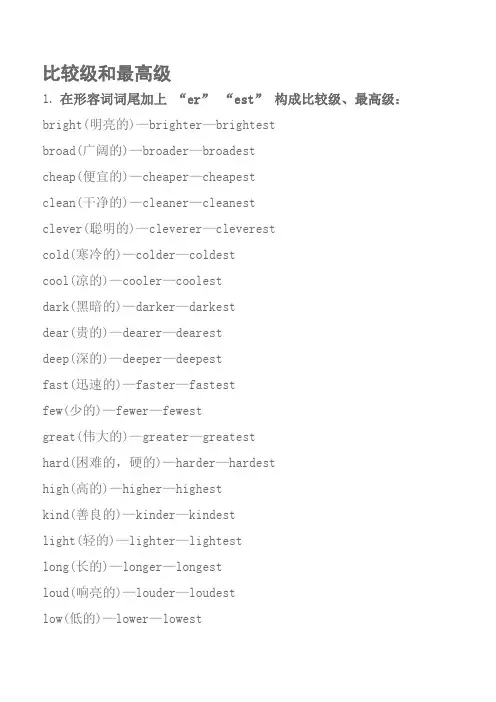
比较级和最高级1.在形容词词尾加上“er”“est”构成比较级、最高级:bright(明亮的)—brighter—brightestbroad(广阔的)—broader—broadestcheap(便宜的)—cheaper—cheapestclean(干净的)—cleaner—cleanestclever(聪明的)—cleverer—cleverestcold(寒冷的)—colder—coldestcool(凉的)—cooler—coolestdark(黑暗的)—darker—darkestdear(贵的)—dearer—dearestdeep(深的)—deeper—deepestfast(迅速的)—faster—fastestfew(少的)—fewer—fewestgreat(伟大的)—greater—greatesthard(困难的,硬的)—harder—hardesthigh(高的)—higher—highestkind(善良的)—kinder—kindestlight(轻的)—lighter—lightestlong(长的)—longer—longestloud(响亮的)—louder—loudestlow(低的)—lower—lowestnew(新的)—newer—newestpoor(穷的)—poorer—poorestquick(快的)—quicker—quickestquiet(安静的)—quieter—quietestrich(富裕的)—richer—richestshort(短的)—shorter—shortestslow(慢的)—slower—slowestsmall(小的)—smaller—smallestsmart(聪明的)—smarter—smartestsoft(柔软的)—softer—softeststrong(强壮的)—stronger—strongestsweet(甜的)—sweeter—sweetesttall(高的)-taller-tallestthick(厚的)—thicker—thickestwarm(温暖的)—warmer—warmestweak(弱的)—weaker—weakestyoung(年轻的)—younger—youngest2.双写最后一个字母,再加上“er”“est”构成比较级、最高级:big(大的)—bigger—biggestfat(胖的)—fatter—fattesthot(热的)—hotter—hottestsad(伤心的)—sadder—saddestthin(瘦的)—thinner—thinnestwet(湿的)—wetter—wettestmad(疯的)—madder—maddest3.以不发音的字母e结尾的形容词,加上“r”“st”构成比较级、最高级:able(能干的)—abler—ablestbrave(勇敢的)—braver—bravestclose(接近的)—closer—closestfine(好的,完美的)—finer—finestlarge(巨大的)—larger—largestlate(迟的)—later—latestnice(好的)—nicer—nicestripe(成熟的)—riper—ripestrude(粗鲁的)—ruder—rudestsafe(安全的)—safer—safeststrange(奇怪的)—stranger—strangestwide(宽广的)—wider—widest wise(睿智的,聪明的)—wiser—wisest white(白的)—whiter—whitest4.以字母y结尾的形容词,把y改为i,再加上“er”“est”构成比较级、最高级:busy(忙碌的)—busier—busiestdirty(脏的)—dirtier—dirtiestdry(干燥的)—drier—driestearly(早的)—earlier—earliesteasy(容易的)—easier—easiestfriendly(友好的)—friendlier—friendliest fun—funnier—funniesthappy(开心的)—happier—happiesthealthy(健康的)—healthier—healthiestheavy(重的)—heavier—heaviesthungry(饿的)—hungrier—hungriestlazy(懒惰的)—lazier—laziestlucky(幸运的)—luckier—luckiestnaughty(调皮的)—naughtier—naughtiestnoisy(嘈杂的)—noisier—noisiestpretty(美丽的)—prettier—prettiestsilly(傻的)—sillier—silliestspicy(辣的)—spicier—spiciestthirsty(渴的)—thirstier—thirstiestugly(丑的)—uglier—ugliest5.双音节、多音节形容词,在单词前面加上“more”“most”构成比较级、最高级:afraid(害怕的)—more afraid—most afraidbeautiful(美丽的)—more beautiful—most beautifulcareful(仔细的)—more careful—most carefulcheerful(开心的)—more cheerful—most cheerfulcrowded(拥挤的)—more crowded—most crowdeddangerous(危险的)—more dangerous—most dangerousdelicious(美味的)—more delicious—most deliciousdifficult(困难的)—more difficult—most difficultexciting(令人兴奋的)—more exciting—most exciting expensive(昂贵的)—more expensive—most expensivefamous(著名的)—more famous—most famoushard-working(勤奋的)—more hard-working—most hard-working helpful(有帮助的)—more helpful—most helpfulhonest(诚实的)—more honest—most honestimportant(重要的)—more important—most importantinteresting(有趣的)—more interesting—most interesting polite(有礼貌的)—more polite—most politeterrible(可怕的)—more terrible—most terribletired(累的)—more tired—most tired6.不规则变化的形容词:bad(坏的)—worse—worstfar(远的)—farther—farthest (far—further—furthest)good(形容词好的)—better—bestwell(副词好的,身体好的)—better—bestill(病的)—worse—worstlittle(少的)—less—leastmany(形容可数多的)—more—mostmuch(形容不可数多的)—more—mostold(年老的)—older—oldest ( old—elder—eldest)。
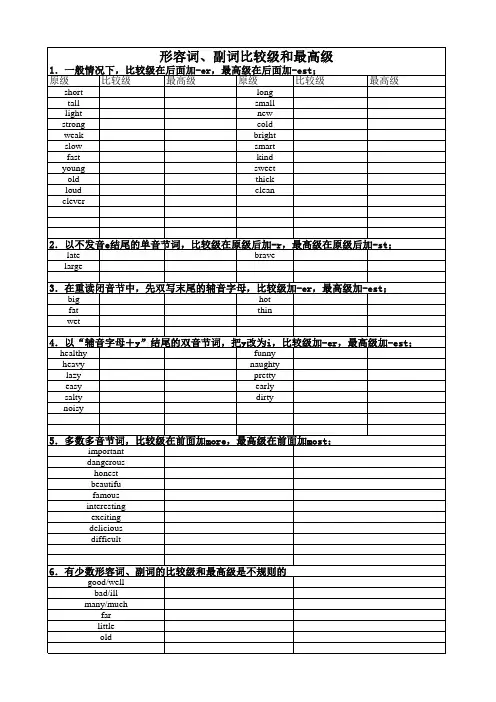
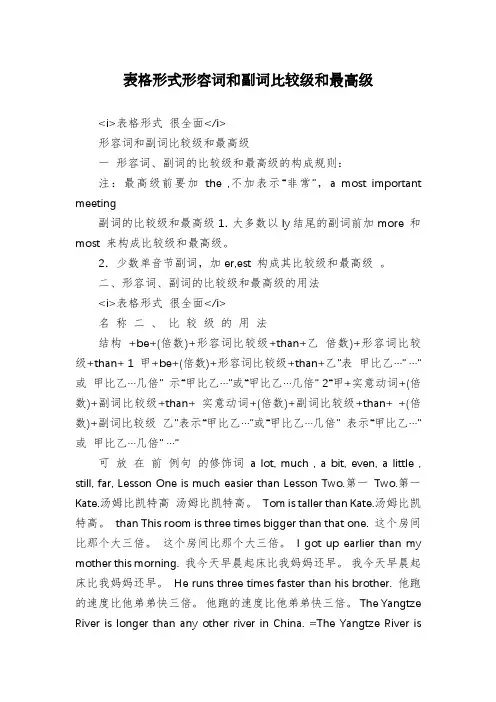
表格形式形容词和副词比较级和最高级<i>表格形式很全面</i>形容词和副词比较级和最高级一形容词、副词的比较级和最高级的构成规则:注:最高级前要加the ,不加表示“非常”,a most important meeting副词的比较级和最高级1.大多数以ly结尾的副词前加more 和most 来构成比较级和最高级。
2.少数单音节副词,加er,est 构成其比较级和最高级。
二、形容词、副词的比较级和最高级的用法<i>表格形式很全面</i>名称二、比较级的用法结构+be+(倍数)+形容词比较级+than+乙倍数)+形容词比较级+than+ 1 甲+be+(倍数)+形容词比较级+than+乙”表甲比乙…” …”或甲比乙…几倍” 示“甲比乙…”或“甲比乙…几倍” 2“甲+实意动词+(倍数)+副词比较级+than+ 实意动词+(倍数)+副词比较级+than+ +(倍数)+副词比较级乙”表示“甲比乙…”或“甲比乙…几倍” 表示“甲比乙…”或甲比乙…几倍” …”可放在前例句的修饰词a lot, much , a bit, even, a little , still, far, Lesson One is much easier than Lesson Two.第一Two.第一Kate.汤姆比凯特高汤姆比凯特高。
Tom is taller than Kate.汤姆比凯特高。
than This room is three times bigger than that one. 这个房间比那个大三倍。
这个房间比那个大三倍。
I got up earlier than my mother this morning. 我今天早晨起床比我妈妈还早。
我今天早晨起床比我妈妈还早。
He runs three times faster than his brother. 他跑的速度比他弟弟快三倍。
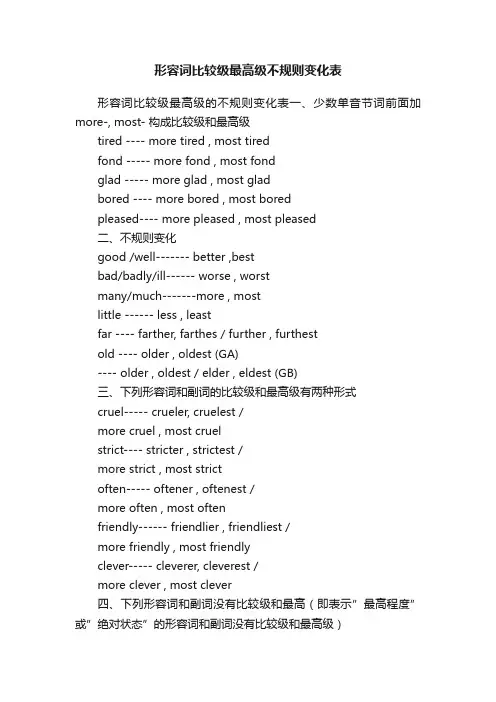
形容词比较级最高级不规则变化表形容词比较级最高级的不规则变化表一、少数单音节词前面加more-, most- 构成比较级和最高级tired ---- more tired , most tiredfond ----- more fond , most fondglad ----- more glad , most gladbored ---- more bored , most boredpleased---- more pleased , most pleased二、不规则变化good /well------- better ,bestbad/badly/ill------ worse , worstmany/much-------more , mostlittle ------ less , leastfar ---- farther, farthes / further , furthestold ---- older , oldest (GA)---- older , oldest / elder , eldest (GB)三、下列形容词和副词的比较级和最高级有两种形式cruel----- crueler, cruelest /more cruel , most cruelstrict---- stricter , strictest /more strict , most strictoften----- oftener , oftenest /more often , most oftenfriendly------ friendlier , friendliest /more friendly , most friendlyclever----- cleverer, cleverest /more clever , most clever四、下列形容词和副词没有比较级和最高(即表示”最高程度”或”绝对状态”的形容词和副词没有比较级和最高级)empty , wrong , perfect , unique , extreme , excellent , favourite (GB)/ favorite (GA) , true , right , correct , extremely ...THANKS致力为企业和个人提供合同协议,策划案计划书,学习课件等等打造全网一站式需求欢迎您的下载,资料仅供参考。
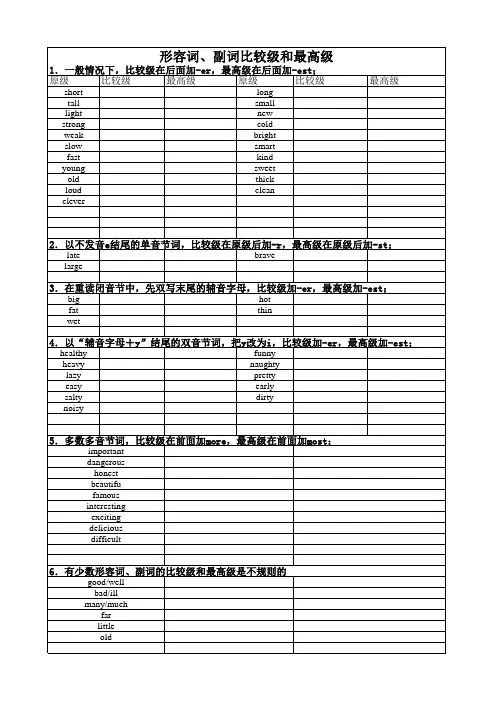
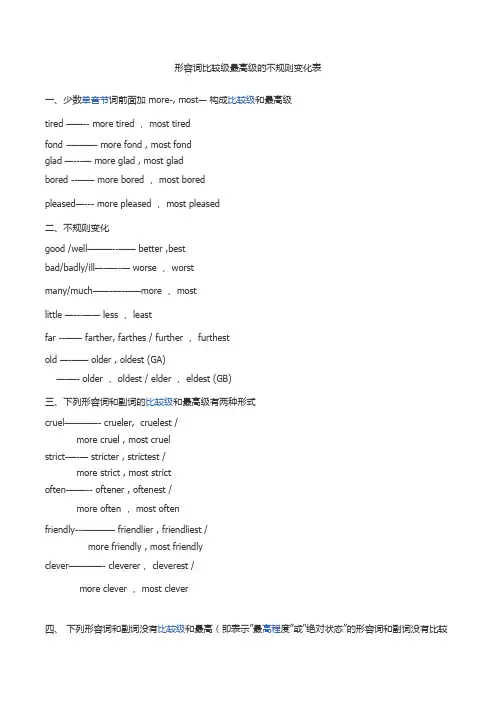
形容词比较级最高级的不规则变化表一、少数单音节词前面加 more-, most—构成比较级和最高级tired ——-- more tired , most tiredfond -———- more fond , most fondglad —---— more glad , most gladbored --—— more bored , most boredpleased—--- more pleased , most pleased二、不规则变化good /well———--—— better ,bestbad/badly/ill—-—--— worse , worstmany/much——-—-——more , mostlittle —---—— less , leastfar --—— farther, farthes / further , furthestold —-—— older , oldest (GA)—-—- older , oldest / elder , eldest (GB)三、下列形容词和副词的比较级和最高级有两种形式cruel————- crueler, cruelest /more cruel , most cruelstrict-—-— stricter , strictest /more strict , most strictoften-——-- oftener , oftenest /more often , most oftenfriendly--———— friendlier , friendliest /more friendly , most friendlyclever————- cleverer, cleverest /more clever , most clever四、下列形容词和副词没有比较级和最高(即表示”最高程度”或"绝对状态”的形容词和副词没有比较级和最高级)empty , wrong , perfect , unique , extreme , excellent , favourite (GB)/ favorite (GA) , true ,right , correct , extremely ..。
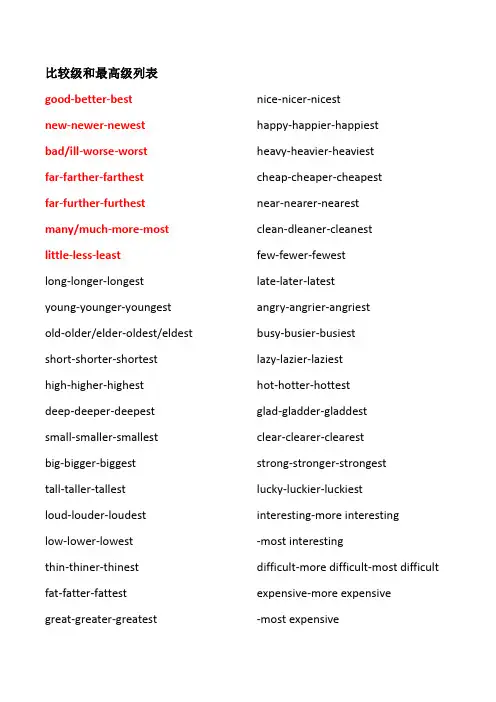
比较级和最高级列表good-better-bestnew-newer-newestbad/ill-worse-worstfar-farther-farthestfar-further-furthestmany/much-more-most little-less-leastlong-longer-longestyoung-younger-youngest old-older/elder-oldest/eldest short-shorter-shortesthigh-higher-highestdeep-deeper-deepestsmall-smaller-smallestbig-bigger-biggesttall-taller-tallestloud-louder-loudestlow-lower-lowestthin-thiner-thinestfat-fatter-fattestgreat-greater-greatest nice-nicer-nicesthappy-happier-happiestheavy-heavier-heaviestcheap-cheaper-cheapestnear-nearer-nearestclean-dleaner-cleanestfew-fewer-fewestlate-later-latestangry-angrier-angriestbusy-busier-busiestlazy-lazier-laziesthot-hotter-hottestglad-gladder-gladdestclear-clearer-cleareststrong-stronger-strongestlucky-luckier-luckiestinteresting-more interesting-most interestingdifficult-more difficult-most difficult expensive-more expensive-most expensive形容词比较级、最高级的构成一、规则变化1. 单音节词和少数双音节词(1)一般情况在原级词尾加-er构成比较级,加-est构成最高级。
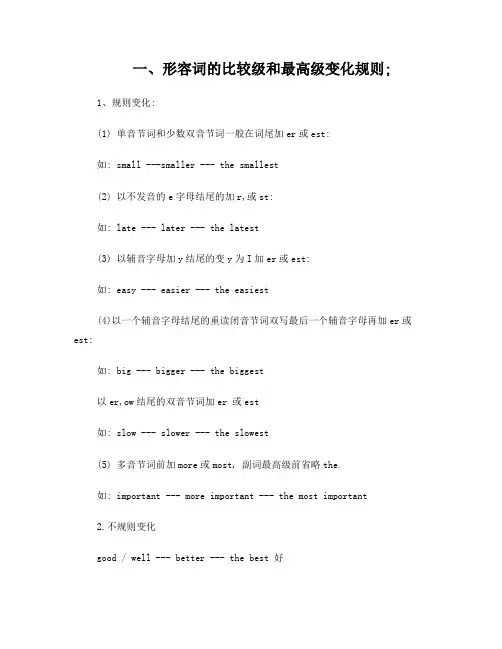
一、形容词的比较级和最高级变化规则;1、规则变化:(1) 单音节词和少数双音节词一般在词尾加er或est:如: small ---smaller --- the smallest(2) 以不发音的e字母结尾的加r,或st:如: late --- later --- the latest(3) 以辅音字母加y结尾的变y为I加er或est:如: easy --- easier --- the easiest(4)以一个辅音字母结尾的重读闭音节词双写最后一个辅音字母再加er或est:如: big --- bigger --- the biggest以er,ow结尾的双音节词加er 或est如: slow --- slower --- the slowest(5) 多音节词前加more或most, 副词最高级前省略the.如: important --- more important --- the most important2.不规则变化good / well --- better --- the best 好bad / badly / ill --- worse --- the worst 坏many / much --- more --- the most 多little --- less --- the least 少old --- older / elder --- the oldest / the oldest 老, 旧far --- farther / further --- the farthest / the furthest 远常见形容词比较级、最高级变化一览表1.在形容词词尾加上“er”“est”构成比较级、最高级:bright(明亮的)—brighter—brightest broad(广阔的)—broader—broadest cheap(便宜的)—cheaper—cheapest clean(干净的)—cleaner—cleanestclever(聪明的)—cleverer—cleverest cold(寒冷的)—colder—coldest cool(凉的)—cooler—coolest dark(黑暗的)—darker—darkest deep(深的)—deeper—deepest fast(迅速的)—faster—fastestfew(少的)—fewer—fewest great(伟大的)—greater—greatest hard(困难的,硬的)—harder—hardest high(高的)—higher—highest kind(善良的)—kinder—kindest light(轻的)—lighter—lightest long(长的)—longer—longest loud(响亮的)—louder—loudestlow(低的)—lower—lowest near(近的)—nearer—nearestnew(新的)—newer—newest poor(穷的)—poorer—poorestquick(快的)—quicker—quickest quiet(安静的)—quieter—quietestrich(富裕的)—richer—richest short(短的)—shorter—shortestslow(慢的)—slower—slowest small(小的)—smaller—smallest smart(聪明的)—smarter—smartest soft(柔软的)—softer—softest strong(强壮的)—stronger—strongest sweet(甜的)—sweeter—sweetest tall(高的)-taller-tallest thick(厚的)—thicker—thickest warm(温暖的)—warmer—warmest weak(弱的)—weaker—weakest young(年轻的)—younger—youngest2.双写最后一个字母,再加上“er”“est”构成比较级、最高级:big(大的)—bigger—biggest fat(胖的)—fatter—fattesthot(热的)—hotter—hottest red(红的)—redder—reddestsad(伤心的)—sadder—saddest thin(瘦的)—thinner—thinnestwet(湿的)—wetter—wettest mad(疯的)—madder—maddest3.以不发音的字母e结尾的形容词,加上“r”“st”构成比较级、最高级:able(能干的)—abler—ablest brave(勇敢的)—braver—bravest close(接近的)—closer—closest fine(好的,完美的)—finer—finest large(巨大的)—larger—largest late(迟的)—later—latestnice(好的)—nicer—nicest ripe(成熟的)—riper—ripestrude(粗鲁的)—ruder—rudest safe(安全的)—safer—safest strange(奇怪的)—stranger—strangest wide(宽广的)—wider—widest wise(睿智的,聪明的)—wiser—wisest white(白的)—whiter—whitest4.以字母y结尾的形容词,把y改为i,再加上“er”“est”构成比较级、最高级: busy(忙碌的)—busier—busiest dirty(脏的)—dirtier—dirtiestdry(干燥的)—drier—driest early(早的)—earlier—earliest easy(容易的)—easier—easiest friendly(友好的)—friendlier—friendliest funny(好玩的)—funnier—funniest happy(开心的)—happier—happiest healthy(健康的)—healthier—healthiest heavy(重的)—heavier—heaviesthungry(饿的)—hungrier—hungriest lazy(懒惰的)—lazier—laziestlucky(幸运的)—luckier—luckiest naughty(调皮的)—naughtier—naughtiest noisy(嘈杂的)—noisier—noisiest pretty(美丽的)—prettier—prettiest silly(傻的)—sillier—silliest spicy(辣的)—spicier—spiciestthirsty(渴的)—thirstier—thirstiest ugly(丑的)—uglier—ugliest4.双音节、多音节形容词,在单词前面加上“more”“most”构成比较级、最高级:afraid(害怕的)—more afraid—most afraidbeautiful(美丽的)—more beautiful—most beautifulcareful(仔细的)—more careful—most carefulcheerful(开心的)—more cheerful—most cheerfulcrowded(拥挤的)—more crowded—most crowdeddangerous(危险的)—more dangerous—most dangerousdelicious(美味的)—more delicious—most deliciousdifficult(困难的)—more difficult—most difficultexciting(令人兴奋的)—more exciting—most exciting expensive(昂贵的)—more expensive—most expensivefamous(著名的)—more famous—most famousfrightened(受惊的)—more frightened—most frightened frightening(令人害怕的)—more frightening—most frightening hard-working(勤奋的)—more hard-working—most hard-working helpful(有帮助的)—more helpful—most helpfulhonest(诚实的)—more honest—most honestimportant(重要的)—more important—most important interesting(有趣的)—more interesting—most interesting polite(有礼貌的)—more polite—most politeterrible(可怕的)—more terrible—most terribletired(累的)—more tired—most tired5.不规则变化的形容词:bad(坏的)—worse—worst good(好的)—better—bestfar(远的)—farther—farthest (far—further—furthest)ill(病的)—worse—worst little(少的)—less—leastmany(多的)—more—most much(多的)—more—mostold(年老的)—older—oldest ( old—elder—eldest)well(好的,身体好的)—better—best一. 写出下列形容词或副词的比较级和最高级.bad ________________ ______________________________clean ________________ ______________________________ famous______________ _______________________dirty _________________ ______________________________big __________________ _____________________________small _________________ ______________________________heavy _____________ ______________________little __________________ ______________________________hard __________________ ______________________________ happy_________________ ______________________________far ___________________ ______________________________ expensive _____________________ ________________________________ well_________________ ______________________________easy __________________ ______________________________ wide___________________ _______________________________ young_________________ ________________________________ rude___________________ ________________________________ cheap___________________ _______________________________ ugly__________________ _________________________________ busy___________________ ________________________________ old____________________ _________________________________ noisy__________________ _________________________________ interesting _____________________ _______________________________ hot____________________ _________________________________ cold___________________ _________________________________ many__________________ ________________________________ bright__________________ _______________________________ boring__________________ _______________________________ difficult_______________________ ________________________________ beautiful _______________________ _____________________________thin _____________________ _______________________________good ____________________ _______________________________strong____________________ ______________________________high _________________ _______________________warm ________________ _______________________late __________________ _______________________weak _________________ ______________________tall ___________________ ______________________short __________________ ______________________loud ___________________ ______________________lazy ___________________ ______________________quick __________________ ______________________angry __________________ ______________________ clever __________________ ______________________ smart __________________ ______________________low ____________________ __________________二、选择填空1. Which does Jimmy like _____ , Chinese or Art?A. wellB. bestC. betterD. much2. The Changjiang River is one of _____ in the world.A. the longest riverB. longest riversC. the longest riversD. longer rivers3. _____ of the two women is Mrs Brown.A. The beautifulB. The more beautifulC. More beautifulD. The most beautiful4. My mooncake is nicer _____ his.A. likeB. withC. forD. than5. You are fatter than _____ .A. heB. hisC. himD. he is tall6. He jumps _____ of the three.A. farB. furtherC. farthestD. furthest7. My hair is longer than _____ .A. my sisterB. KateC. my brother’sD. Lucys’8. There are _____ paper here .Please bring some.A. littleB. lessC. fewerD. a little9. The pen is _____ than that one.A. more cheapB. cheapC. much cheaperD. quite cheaper10.Tom speaks Chinese _____ better than Jimmy.A. moreB. veryC. a lot ofD. much11.There are _____ girls in Class Two than in Class Four.A. moreB. nicestC. mostD. best12.It’s too _____ for you to do that.A. easyB. more dangerousC. harderD. the easiest13.Who has _____ apples now, Jim, Lily or Lucy?A. muchB. biggestC. betterD. the most14.You have more rulers than me. But _____ are nicer than _____ .A. mine, yoursB. mine, yourC. my, yoursD. my, your15.Tingting is _____ than Meimei, but Meimei is _____ than Tingting.A. all, strongerB. taller, strongestC. tallest, strongD. taller, stronger16.Mother is _____ in my family.A. busyB. busierC. the busiestD. more busy17.There are _____ in the park on Sunday.A. more childrenB. a lot of peopleC. much men and womenD. many peoples18.-This blue sweater is too big for me .-Will you please show me a _____ one?A. smallB. smallerC. the smallestD. smallest19.No one is _____ Mary in the class.A. so tallest asB. as taller asC. so high asD. so tall as20. This bike is _____ than that one.A. twenty yuan dearB. twenty yuan dearerC. dear twenty yuanD. dearer twenty yuan[参考答案] CCDDA CDBCD AADAD CBBDB三、用所给词的适当形式填空1.Your classroom is _____ (wide) and _____ (bright) than ours.2.There are _____ (few) hours of sunlight a day in winter than in summer.3.Which do you like _____ (well) , maths or chemistry?4.This is the _____ (good) film I have ever seen.5.Africa is the second _____ (large) continent.6.What he said made his mother much _____ (angry) .7.I’m not as _____ (careful) as he.8.We’ve got as _____ (many) books as we need.9.Pratice as _____ (much) as you can.10.They have done _____ (much) work with _____ (little) money.11.You’re the _____ (kind) person I’ve ever met.12.He is _____ (young) than his two sisters.13.The _____ (old) I get, the _____ (strong) I seem to feel.14.The weather is getting _____ (warm) and _____ (warm) .15.Summer is _____ (hot) season of the year.[参考答案] 1. wider, brighter 2. fewer 3. better 4. best 5. largest 6. angry 7. careful 8. many 9. much 10. more, less 11. kindest 12. younger 13. older, stronger, 14. warmer, warmer 15. the hottest。
